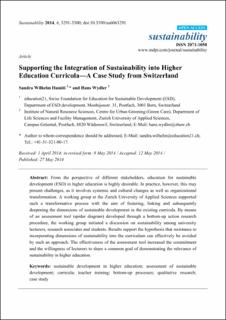Please use this identifier to cite or link to this item:
https://doi.org/10.21256/zhaw-4853Full metadata record
| DC Field | Value | Language |
|---|---|---|
| dc.contributor.author | Wilhelm Hamiti, Sandra | - |
| dc.contributor.author | Wydler, Hans | - |
| dc.date.accessioned | 2018-10-29T15:47:17Z | - |
| dc.date.available | 2018-10-29T15:47:17Z | - |
| dc.date.issued | 2014 | - |
| dc.identifier.issn | 2071-1050 | de_CH |
| dc.identifier.uri | https://digitalcollection.zhaw.ch/handle/11475/12305 | - |
| dc.description.abstract | From the perspective of different stakeholders, education for sustainable development (ESD) in higher education is highly desirable. In practice, however, this may present challenges, as it involves systemic and cultural changes as well as organizational transformation. A working group at the Zurich University of Applied Sciences supported such a transformative process with the aim of fostering, linking and subsequently deepening the dimensions of sustainable development in the existing curricula. By means of an assessment tool (spider diagram) developed through a bottom-up action research procedure, the working group initiated a discussion on sustainability among university lecturers, research associates and students. Results support the hypothesis that resistance to incorporating dimensions of sustainability into the curriculum can effectively be avoided by such an approach. The effectiveness of the assessment tool increased the commitment and the willingness of lecturers to share a common goal of demonstrating the relevance of sustainability in higher education. | de_CH |
| dc.language.iso | en | de_CH |
| dc.publisher | MDPI | de_CH |
| dc.relation.ispartof | Sustainability | de_CH |
| dc.rights | http://creativecommons.org/licenses/by/3.0/ | de_CH |
| dc.subject.ddc | 338.927: Umweltökonomie und nachhaltige Entwicklung | de_CH |
| dc.subject.ddc | 378: Hochschulbildung | de_CH |
| dc.title | Supporting the integration of sustainability into higher education curricula : a case study from Switzerland | de_CH |
| dc.type | Beitrag in wissenschaftlicher Zeitschrift | de_CH |
| dcterms.type | Text | de_CH |
| zhaw.departement | Life Sciences und Facility Management | de_CH |
| dc.identifier.doi | 10.21256/zhaw-4853 | - |
| dc.identifier.doi | 10.3390/su6063291 | de_CH |
| zhaw.funding.eu | No | de_CH |
| zhaw.issue | 6 | de_CH |
| zhaw.originated.zhaw | Yes | de_CH |
| zhaw.pages.end | 3300 | de_CH |
| zhaw.pages.start | 3291 | de_CH |
| zhaw.publication.status | publishedVersion | de_CH |
| zhaw.volume | 6 | de_CH |
| zhaw.publication.review | Peer review (Publikation) | de_CH |
| Appears in collections: | Publikationen Life Sciences und Facility Management | |
Files in This Item:
| File | Description | Size | Format | |
|---|---|---|---|---|
| 2014_Wydler_Supporting_the_integration_of_sustainability.pdf | 618.96 kB | Adobe PDF |  View/Open |
Show simple item record
Wilhelm Hamiti, S., & Wydler, H. (2014). Supporting the integration of sustainability into higher education curricula : a case study from Switzerland. Sustainability, 6(6), 3291–3300. https://doi.org/10.21256/zhaw-4853
Wilhelm Hamiti, S. and Wydler, H. (2014) ‘Supporting the integration of sustainability into higher education curricula : a case study from Switzerland’, Sustainability, 6(6), pp. 3291–3300. Available at: https://doi.org/10.21256/zhaw-4853.
S. Wilhelm Hamiti and H. Wydler, “Supporting the integration of sustainability into higher education curricula : a case study from Switzerland,” Sustainability, vol. 6, no. 6, pp. 3291–3300, 2014, doi: 10.21256/zhaw-4853.
WILHELM HAMITI, Sandra und Hans WYDLER, 2014. Supporting the integration of sustainability into higher education curricula : a case study from Switzerland. Sustainability. 2014. Bd. 6, Nr. 6, S. 3291–3300. DOI 10.21256/zhaw-4853
Wilhelm Hamiti, Sandra, and Hans Wydler. 2014. “Supporting the Integration of Sustainability into Higher Education Curricula : A Case Study from Switzerland.” Sustainability 6 (6): 3291–3300. https://doi.org/10.21256/zhaw-4853.
Wilhelm Hamiti, Sandra, and Hans Wydler. “Supporting the Integration of Sustainability into Higher Education Curricula : A Case Study from Switzerland.” Sustainability, vol. 6, no. 6, 2014, pp. 3291–300, https://doi.org/10.21256/zhaw-4853.
Items in DSpace are protected by copyright, with all rights reserved, unless otherwise indicated.